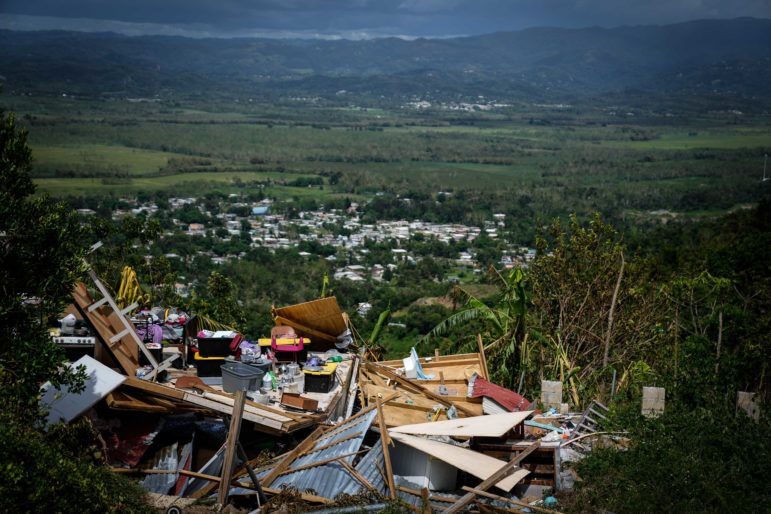“There’s no excuse not to transition to a system that is better, increasingly resilient, and more affordable than it was before. All members of Congress should call on FEMA to ensure this common-sense transition. “

Michael Appleton/Mayoral Photography Office
New York City Mayor Eric Adams tours a village outside of Cabo Rojo, Puerto Rico, which was damaged by Hurricane Fiona.Before Hurricane Fiona struck Puerto Rico, residents of the Island were already living in disaster-like conditions. It would be a mistake to think this is a stroke of misfortune or simply more evidence of climate fury.
What too many looked away from was intermittent electrical service and long black-out periods under the inefficiency of the electrical grid operator US-Canadian LUMA Energy. Despite being paid more than $160.8 million prior to June 1, 2021, LUMA’s lack of planning during their transition as the Island’s grid operator has resulted in major day-to-day blackouts affecting more than 900,000 customers; interruptions of critical electricity service in hospitals, residences; damage to public and commercial equipment; and even fires. The intense foreboding Puerto Rican residents and businesses—most of whom do not have resources to install renewable energy micro-grids—were feeling has come to pass, as the grid began to collapse before Fiona touched down.
The abundant warnings were already there. An island-wide blackout on April 6 remains under investigation and under a shroud of secrecy. Blackouts have become even more frequent this year, according to the PR Energy Bureau (PREB), the entity that measures some of LUMA’s performance. LUMA has outright bucked demands for transparency and delayed attempts by PREB, elected officials and community organizations to hold the consortium accountable.
Last week, New York Attorney General Letitia James rightfully demanded an investigation into LUMA’s contract and called for greater accountability for the people of Puerto Rico; more of our political leaders should join her and do the same.
The $1.5 billion contract between the government of Puerto Rico and LUMA that privatized electricity distribution is tied to the availability of historic amounts of FEMA and other federal funds for Puerto Rico’s recovery and electric grid reconstruction. LUMA is tasked with administering at least $9.5 billion dollars of FEMA funds as part of its deal to repair and reinforce the transmission system.
Yet the contract glaringly lacks any obligations or incentives for LUMA to comply with existing local and federal renewable energy goals. Instead, it instructs LUMA to align its use of federal funds with the Puerto Rico Grid Modernization Plan—which mandates increased natural gas use—and Puerto Rico Energy Authority’s (PREPA) 10-year plan, which excludes renewable energy. This runs counter to President Biden’s climate and public health policies, such as the Justice 40 Initiative, and recent executive orders.
Additionally, the LUMA contract is trampling over the rights of workers. The contract violates existing collective bargaining agreements and executive orders aimed at protecting workers, and undermines their pension system. Even Puerto Rico’s Senate minority leaders denounced LUMA stripping workers of their rights and reassigning experienced power-line employees to unrelated jobs in other government agencies.
FEMA’s inaction on this front is helping privatization that is harming Puerto Ricans. A 2021 report by the U.S. Government Accountability Office (GAO) found that since recovery started in Puerto Rico, FEMA has failed to create mechanisms for evaluating, responding to, or addressing the agency’s own recovery objectives. Also troubling is FEMA’s Finding of No Significant Impact (FONSI) for Puerto Rico’s Utility Repair, Replacement, and Realignment plans, without proactively and thoroughly analyzing and discussing renewable energy and microgrid alternatives.
Puerto Rican and national organizations such as Earthjustice, IEEFA and the Queremos Sol coalition have written multiple letters, reports, and comments regarding this decision and urging FEMA to course correct. It’s clear to many that FEMA’s actions don’t align with the agency’s framework for ensuring public participation and principles for rebuilding with climate resilience in mind.
There’s no excuse not to transition to a system that is better, increasingly resilient, and more affordable than it was before. All members of Congress should call on FEMA to ensure this common-sense transition.
Likewise, President Biden should heed the warnings of Puerto Rican civil society and keep his promise to the people of Puerto Rico by directing FEMA to detain federal funding of grid reconstruction until the public private partnership with LUMA (or any third party subrecipient) effectively serves the purpose of resilient and equitable recovery as set forth by federal and local policy. This may entail the revision of the contracting arrangement and local applicable law by the Government of Puerto Rico.
Furthermore, the White House-appointed Puerto Rico Task Force should integrate mechanisms for public input and participation at the front of their investigation of these issues, and identify and implement effective actions to ensure equity and resiliency in Puerto Rico’s electric grid reconstruction.
Anything other than effective action that responds to repeated demands from the people of Puerto Rico is a message that we are being forced to leave or left to die.
Dr. Adi Martínez is director of operations for the University of Puerto Rico Resiliency Law Center.








